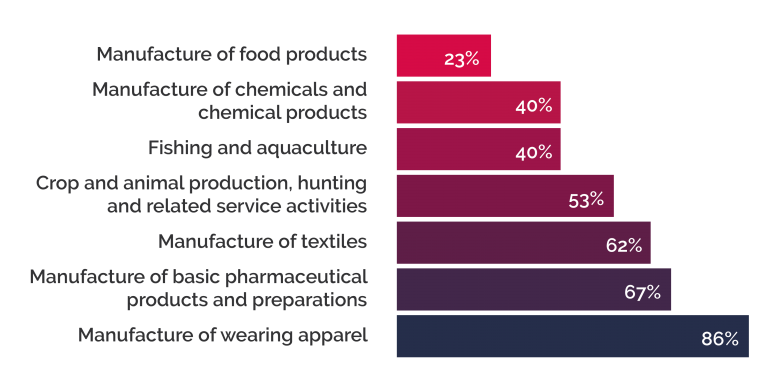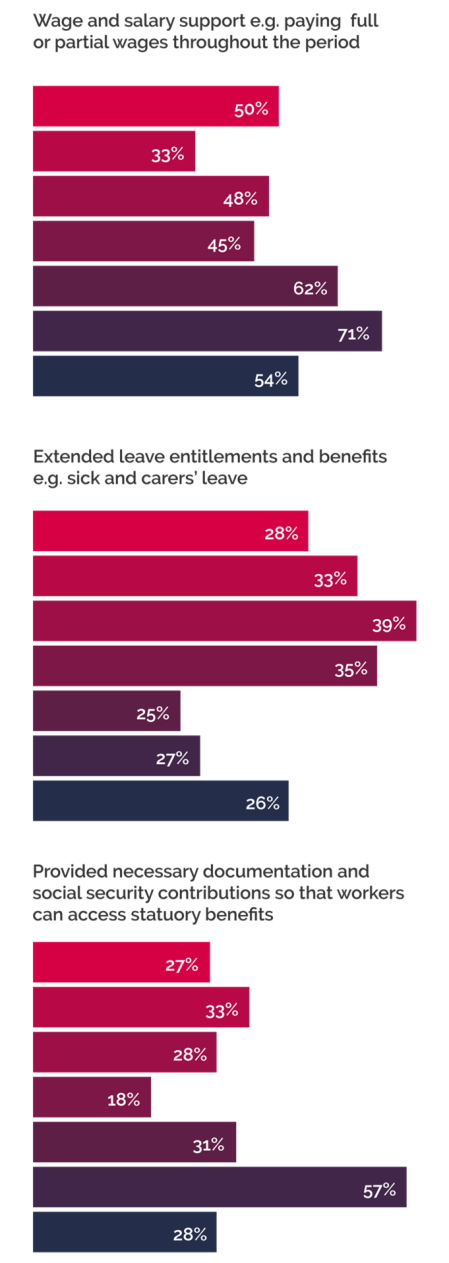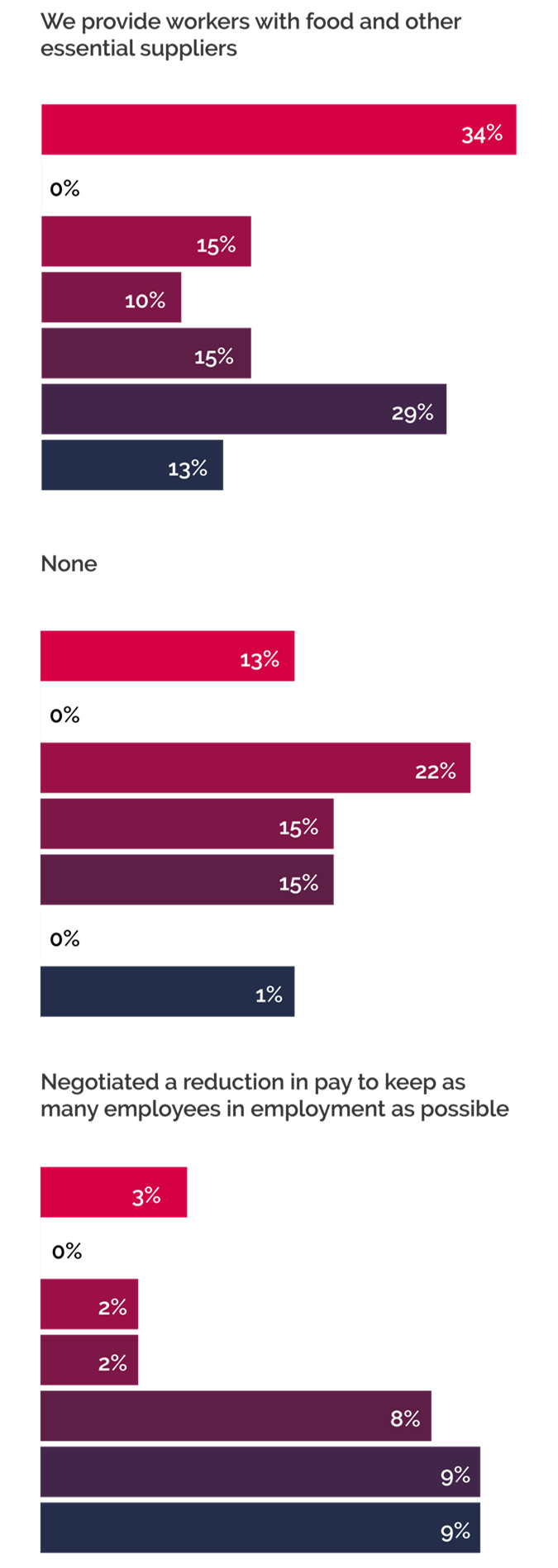Fewer orders, increased overtime and workers off for care duties: new data highlights COVID-19 impacts to suppliers
The disruption to businesses globally by the COVID-19 pandemic is widely known. But how many companies know how their suppliers, and workers in their supply chains, have been affected?
In November Sedex will release a new COVID-19 Impacts report, sharing insights from a multitude of countries and sectors around the world. Here we share an advance look at the effect of the pandemic on suppliers that our data reveals.
These initial insights show a snapshot of the impacts that nearly 600 suppliers in a sample cross-section of industries, including agriculture, food production, textiles and garment manufacturing, have seen over the past six months.
What business impacts have these suppliers experienced?[1]
Some industries have seen a significant drop in demand, while others have seen a rise. Both situations are affected by workers requiring time off for illness or caregiving duties.
- Over a third of these businesses (37%) are experiencing decreased demand
- 34% have increased worker overtime to manage labour shortages.
- Restriction of movement and workers taking time off for care duties are affecting workforce capacities. In China, 78% of respondents say restriction of movement is the main factor affecting their workforce capacity.
- 99% of sites have implemented measures to protect their workers from the spread of COVID-19. The most popular are health protection measures like antibacterial gel and personal protective equipment (93%), increased cleaning (90%), processes for when someone gets ill (88%), and adapting site facilities (83%).
These insights come from a COVID-19-specific questionnaire on how suppliers’ orders and workforces have been affected by the pandemic, and the measures they have taken both in response to these changes and to protect workers from the spread of COVID-19.
What have been the business impacts of COVID-19?
Decreased orders

COVID-19 infections
23% of sites across these sectors reported that workers had contracted COVID-19. Almost all were in food-related sectors (Crop and Animal Production, Manufacture of Food Products and Fishing and Aquaculture).
To address this, around half of these businesses reported that they would send workers home, who have symptoms or who have been in contact with someone suffering from COVID-19.
Disproportionate impact on female workers
Recent humanitarian research suggests that women are more negatively impacted by the pandemic than men, with the pandemic serving to widen systemic gender related inequalities[2]. Sedex’s data correlates with these findings.
Women make up a higher proportion of the workforce in sectors that these findings indicate are hardest hit by the pandemic, particularly in apparel and textile manufacturing sectors, where 4 in 5 businesses are reporting decreased demand.
The apparel and textile manufacturing sectors also saw the lowest share of respondents reporting extending leave entitlements (17% and 15% respectively) to support workers during periods of illness, allowing them to be on leave for longer.
A significant proportion of businesses (60%) in apparel manufacturing reported workers taking time off for care duties. These findings indicate that this situation may further reinforce existing gender pay gaps, as women are more likely to bear the brunt of caregiving duties.
How are these suppliers managing these impacts?
Businesses experiencing decreased demand have a surplus of workers and workforce capacity; they are required to reduce their operations accordingly. The implications for workers here include a loss of income and increased job insecurity.
The most vulnerable workers include people on low wages (often with little/no savings to support them through periods of no work) and those on temporary or casual contracts who are more likely to lose their jobs when business operations are reduced.
Other businesses that have been affected by increased demand or a loss of workers and are required to manage this labour shortage. Workers needing to take time off for care duties further exacerbates the shortage.
35% of businesses have reduced production and operations to manage their workforce shortages. This can have depressing consequences – in Australia, for example, farmers have been forced to destroy crops due to a lack of workers to gather this year’s harvest.[3]
34% of businesses have increased overtime to cope with a shortage of labour. Increases in overtime come with risks of excessive hours for workers, jeopardising their safety and wellbeing. While overtime should always be voluntary, workers may experience heightened pressure from businesses to work long hours in response to increased demands or labour shortage.[4]
How are these suppliers supporting workers during the disruption?
It is encouraging to see a high proportion of companies extending leave entitlements, as this can provide vital support to workers during periods of illness.
- The most common way to support workers is through wage/salary support (50%) – for example, continuing to pay wages.
- 31% have extended leave entitlement.
- Almost half the respondents (from selected sectors) are not putting any additional measures in place for migrant workers.
What actions have been taken to support workers to manage the financial impact of the virus?



How can businesses support their suppliers?
It is critical that businesses support their suppliers, to protect their supply chains and the workers within them.
There are many ways businesses can provide this support, beginning with good purchasing practices and open lines of communication to understand suppliers’ biggest challenges. Learn more on our COVID-19 Guidance Hub.
What is the COVID-19 Modular SAQ?
Sedex has developed the COVID-19 Modular SAQ as part of our support for businesses during the pandemic. While business disruption can be assumed, additional research
helps businesses understand the impact of COVID-19 on their suppliers, global supply chains and the workers within them, to support informed decision-making for supply chain resilience.
The COVID-19 Modular SAQ is a free tool, included in Sedex membership to support businesses during this difficult time. It is an excellent way to engage with suppliers and understand their needs during the disruption caused by the pandemic.
Learn more about our other tools to support businesses through the current situation:
- Sedex Virtual Assessment – conduct supply chain assessments remotely using video technology
- Direct Worker Reporting – get anonymous feedback from workers on the ground through mobile technology
[1] 597 sites from the agriculture, food production, textiles, apparel, and pharmaceuticals sectors have completed the COVID-19 Modular SAQ to date, representing over 230,000 male and female workers.
[2] https://insights.careinternational.org.uk/media/k2/attachments/CARE_RGA_SheToldUsSo_Sept-2020.pdf
[3] https://www.dailymail.co.uk/news/article-8741285/Why-groceries-FAR-expensive-Aussie-farmers-forced-destroy-crops.html
[4] https://www.bsr.org/en/our-insights/blog-view/why-modern-slavery-risks-should-be-top-of-mind-for-businesses-covid-19


